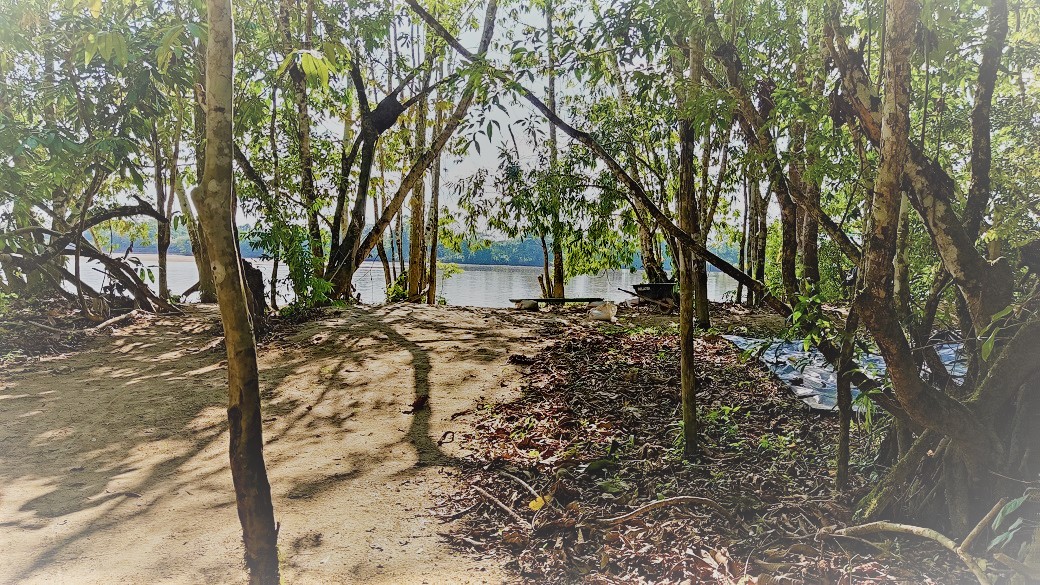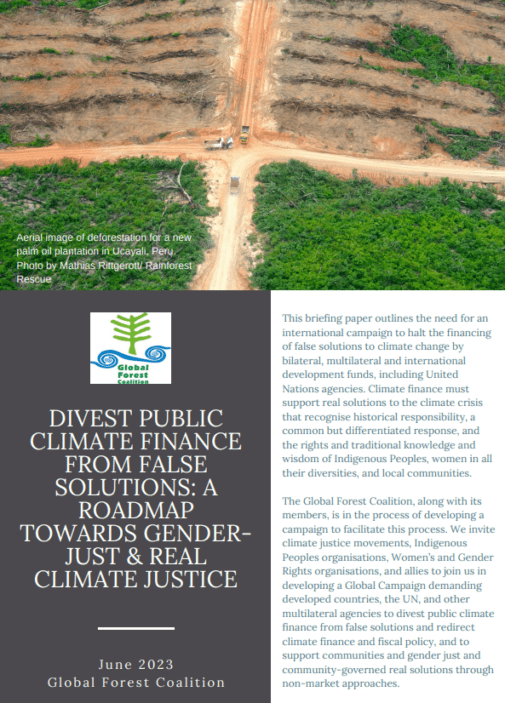Un changement transformateur avec une justice environnementale et de genre nécessite de vraies solutions climatiques, et non des schémas tels que les “solutions basées sur la nature”.

La Coalition mondiale des forêts (GFC) contribue régulièrement aux processus de l’ONU sur des questions telles que les forêts, la biodiversité, le changement climatique et le genre, afin d’apporter les perspectives et les priorités de nos groupes membres dans les espaces internationaux de prise de décision. Ce mois-ci, le Programme des Nations Unies pour l’environnement a recueilli des commentaires sur les solutions fondées sur la nature, une notion qui a été utilisée de manière très discutable pour promouvoir des approches fondées sur le marché face aux crises du climat et de la biodiversité, telles que la compensation des émissions de carbone, des approches qui utilisent la même logique capitaliste que celle qui a provoqué les crises en premier lieu. Voici notre proposition pour un tel processus de consultation.
Crédit photo : Fernando Franceschelli
Proposition pour la première consultation intergouvernementale du Programme des Nations Unies pour l’environnement sur les solutions basées sur la nature (NbS)
Coalition mondiale des forêts (GFC)
mai 2023
La Coalition mondiale des forêts (GFC), une ONG composée de plus de 120 organisations membres de peuples autochtones et de communautés locales du monde entier, remercie le Programme des Nations unies pour l’environnement (PNUE) et les coprésidents de lui avoir donné l’occasion de soumettre des propositions lors de la première consultation intergouvernementale sur les solutions fondées sur la nature (NbS).
La GFC se joint aux voix des pays et des parties prenantes qui expriment leur inquiétude quant aux impacts des solutions fondées sur la nature (NbS) sur les peuples autochtones, les communautés locales, les femmes dans toute leur diversité, les jeunes et les afro-descendants.
Continuer en anglais…
Resolution 5/5 recognizes “the need for analysis of the effects of nature-based solutions…, acknowledging that they do not replace the need for rapid, deep and sustained reductions in greenhouse gas emissions.” Despite this resolution, nature-based solutions continue to be a concept used to falsely brand highly questionable and even blatantly harmful practices as environmentally-friendly or “green.”
We support the implementation of ecosystem approaches, as a way to address the root causes of the climate crisis, rather than reproducing a colonialistic climate regime that promotes the greenwashing of carbon offsetting programmes. The ecosystem approach, which is rooted in the Convention on Biological Diversity (CBD) and its COP decisions, is the primary framework for action under the Convention, as described by the Conference of the Parties. The Intergovernmental Panel on Climate Change (IPCC) also recognizes in its AR6 Synthesis Report that ecosystem-based adaptation approaches have been effective in climate mitigation.
In accordance with one of the tasks of this consultation, we request that science-based analyses of the effects of NbS, including differentiated impacts on women in all their diversity, Indigenous peoples and underrepresented groups, are carried out prior to continued support for these schemes. A compilation of bad NbS practices would also contribute to making an unbiased assessment, enrich the discussion, and address challenges to the most vulnerable groups, especially in the Global South. Market-based approaches inherently favor those with economic power and tend to further entrench inequalities faced by women, Indigenous peoples and other marginalized groups that are economically, socially and politically underrepresented. Avoiding any policy framework that allows the continuation of nature-based solutions under the guise of market-oriented processes is fundamental to supporting rights-based and gender-just approaches in biodiversity conservation and climate change mitigation.
GFC also opposes any support for new funding sources from the private sector, especially in the Global South, as well as the financialization of nature through any project seeking investment opportunities arising from the conservation, restoration and sustainable use of nature.
Climate and forest-related policies that are born of existing anthropocentric, colonial and patriarchal mindsets only perpetuate the root causes of the crisis they are supposed to tackle. In doing so, they fail to deal with the uneven distribution of access to and control over resources experienced by frontline communities on the basis of gender, class, race, caste, age and ability, among other factors.
As a result, they maintain an unjust, unequal system with intersecting forms of oppression that reproduces and strengthens structural barriers instead of breaking them down. Women, especially Indigenous and rural women, are more vulnerable to climate change and land use change such as deforestation, and addressing gender inequality is central to effective climate mitigation and adaptation.
Gender-blind climate policy-making that promotes false solutions rather than ecosystem approaches is a major concern for many civil society organizations, as demonstrated by a recent case study published by GFC. Seeking transformative change through gender and environmental justice demands real solutions to the climate regime, not schemes linked to the same corporations, industries and governments responsible for much of the historical and ongoing damage to the planet and communities worldwide.
Real emissions reductions are far more crucial than nature-based solutions that do not propose transformative action on gender-just and human rights-based approaches. GFC looks forward to continuing to support the UNEP in promoting a common agenda that advocates for environmental and gender justice while respecting the principles of multilateralism and plural approaches.







